Today we have Intel Xeon D-1518 benchmarks. Our most popular topic in 2015 was Intel Xeon D and in November 2015 we heard about the Intel Xeon D wave 2 launch. Continuing the tradition of having the first benchmarks of the Xeon D-1540 and Xeon D-1520 we now have the first D-1518 benchmarks. The Intel Xeon D-1518 is a Xeon D-1500 wave 2 processor and the “8” in the model name lets us know that it is a networking optimized SKU. Like the Intel Xeon D-1520, it is a 4 core/ 8 thread chip with 6MB last level cache. The base frequency is 2.2GHz with no Turbo Boost. Cost wise the listed prices are about $35 more for the D-1518 over the D-1520 but there is one big advantage: the Xeon D-1518 is a 35w TDP processor v. 45w for the D-1520.
For those interested, here is where the Xeon D-1518 falls in the currently announced Xeon D lineup:
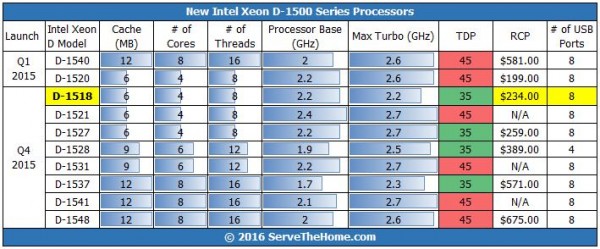
One can see that it is one of the lower power, 35w TDP SoC’s and will likely represent the lower bound of Xeon D performance given the currently announced parts.
Test Configuration
Our test platform is the Supermicro X10SDV-4C-TLN4F. We will have a review of the motherboard shortly, complete with power and thermal imaging as we normally do.
- CPU: Intel Xeon D-1518 (embedded)
- Motherboard: Supermicro X10SDV-4C-TLN4F
- Memory: 64GB – 4x Samsung 16GB DDR4 2133MHz ECC RDIMM
s
- SSD: 1x Intel DC S3700 400GB
- Operating System: Ubuntu 14.04.3 LTS, OpenSUSE 13.2
We actually saw results that we did not expect so we re-benchmarked the D-1520 side-by-side to ensure we had consistent results. We did test this configuration using our new OpenSUSE Linux-Bench appliance so if you are browsing results, you will see a set that is considerably faster. For now, we are still using Ubuntu 14.04.3 LTS as our standard.
As another note, we tried picking some interesting comparisons out of our dataset. We decided against pitting this processor against dual E5-2699 V3 chips for obvious reasons. We did try to include some older results as often these chips will be replacing legacy hardware that can be several years old.
Intel Xeon D-1518 Benchmarks
For our testing we are using Linux-Bench scripts which help us see cross platform “least common denominator” results. We are using gcc due to its ubiquity as a default compiler. One can see details of each benchmark here. We are likely going to update the Linux-Bench in the near future with a few new tests as well as an even simpler to use/ faster revision, but for now, we are using our old Ubuntu 14.04.3 version.
c-ray 1.1 Performance
We have been using c-ray for our performance testing for years now. It is a ray tracing benchmark that is extremely popular to show differences in processors under multi-threaded workloads.

One of the most interesting aspects of this is that we are seeing a 35w TDP CPU here. c-ray is a good tool to quickly gauge multi-threaded benchmark loads. What we thought was impressive at 45w in mid-2015 (D-1520), we see six months later Intel is basically doing with a 22% lower TDP.
7-zip Performance
7-zip is a widely used compression/ decompression program that works cross platform. We started using the program during our early days with Windows testing. It is now part of Linux-Bench.
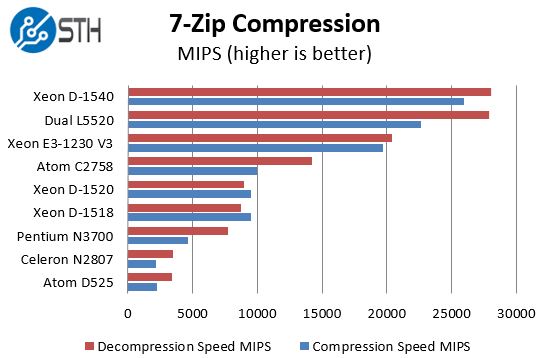
At 35w the chip sits near last year’s Xeon D-1520 while showing a clear performance improvement over some of the lower-power and older parts.
NAMD Performance
NAMD is a molecular modeling benchmark developed by the Theoretical and Computational Biophysics Group in the Beckman Institute for Advanced Science and Technology at the University of Illinois at Urbana-Champaign. More information on the benchmark can be found here.
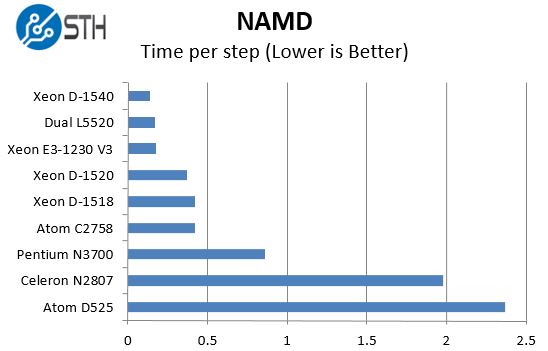
Here again we see very solid results from the new chip roughly equal to a D-1520 performance despite not having Turbo Boost and a 22% lower TDP.
Sysbench CPU test
Sysbench is another one of those widely used Linux benchmarks. We specifically are using the CPU test, not the OLTP test that we use for some storage testing.
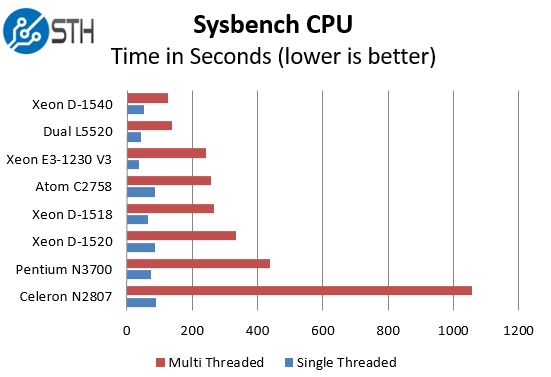
As one might notice, the Atom D525 is not on this chart. The simple reason is that the legacy part is so slow it would cause our x-axis to extend to around 5000, making the remainder of the results unreadable. Here we see the D-1518 actually pulls ahead a bit over the D-1520 which we were not expecting. We did re-test in the same chassis to confirm this result.
OpenSSL Performance
OpenSSL is widely used to secure communications between servers. This is an important protocol in many server stacks. We first look at our sign tests:
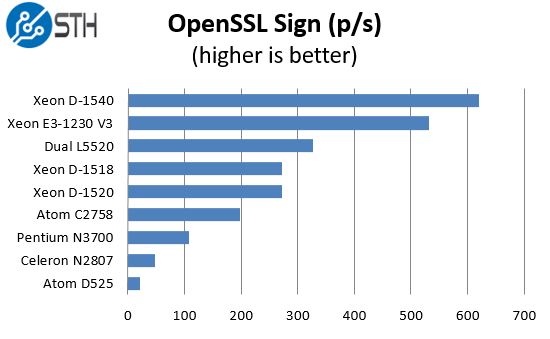
One can see here the speed of the part is excellent given the TDP. Moving to the verify results:
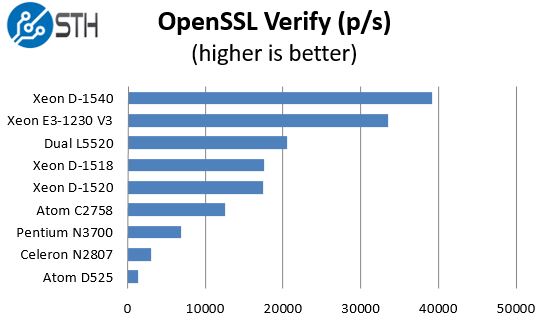
For those thinking about building a HAproxy server with SSL offload or OpenSSL VPN appliance, the Xeon D-1518 is an interesting option. It is low power and relatively inexpensive.
UnixBench Dhrystone 2 and Whetstone Benchmarks
Of course, these chips are not meant for heavy compute but we pick out the UnixBench 5.1.3 Dhrystone 2 and Whetstone results to show some of the raw performance they are capable of. UnixBench is widely used so it is a good comparison point.
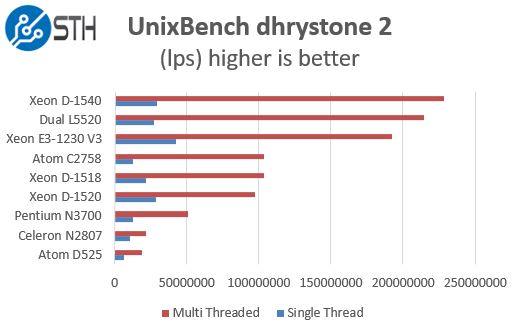
Single threaded results show the D-1520 ahead likely due to Turbo boost working effectively. On the multi-threaded results we see the D-1518 pull ahead which we were surprised by. It may also be that these benchmarks are being run after thorough heat soaking when Intel Turbo Boost is less likely to activate on the D-1520.
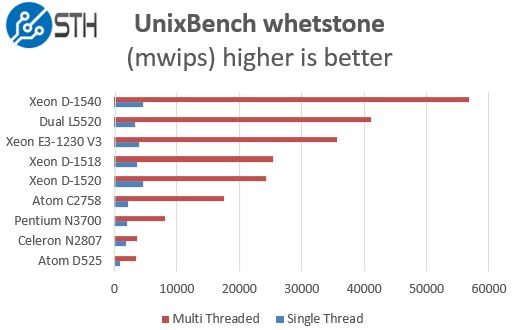
On the floating point side we see a similar trend. The new Xeon D-1518 takes what we saw with the D-1520 and provides much improved performance per watt. In single threaded mode, the D-1520 does show that it can be the more capable option there.
HardInfo CPU Cryptohash
Perhaps some of the most standard benchmarks that come along with many versions of Ubuntu, the hardinfo suite has been a mainstay at STH.
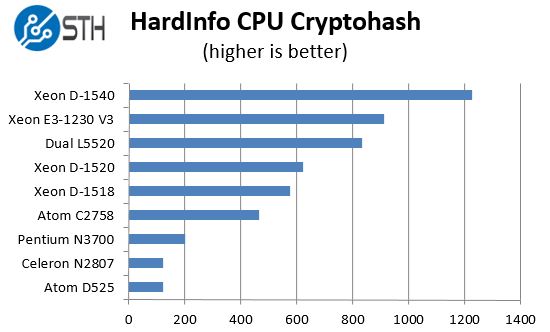
While not the fastest CPU around, the Xeon D-1518 is providing a solid performance in its power consumption range and a performance very close to that of the Xeon D-1520.
Conclusion
The Intel Xeon D series is awesome. Performance of the second wave of chips is going up as TDP goes down. We have the Xeon D-1528 (6 cores/ 12 threads) in the lab right now so expect more 35w TDP Xeon D results shortly. We are very excited to see the new D-1518 perform well. We will have power consumption and thermal imaging of the Intel Xeon D-1518 test platform, the Supermicro X10SDV-4C-TLN4F, in a few days, but one can see that the performance is very solid. Remember for an E3-1230 V3 or a dual L5520 configuration to attain those results, the overall platforms are using 2.5-4x as much power once you add in a dual 10Gbase-T NIC. If the memory, storage and PCIe slots are enough for your application, the Xeon D-1518 does provide an extremely compelling SoC option.





Good test ! Thanks
As we can see, Xeon D 1518 and Avoton C2758 performances are very similar. And Avoton cost a little less money.
You confirm that ?
What difference of power consumption between the two platforms (D1518 vs C2758) ?
Hi Gege – you should see a review of the platform this week with that information.
You wrote>”… Four our testing we are using Linux-Bench scripts …”
You meant to write FOR.
Thanks for the catch!